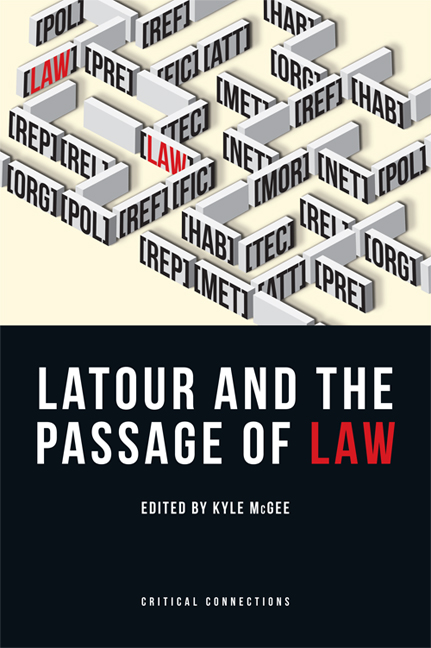Book contents
- Frontmatter
- Contents
- Introduction
- 1 From the Conseil d’État to Gaia: Bruno Latour on Law, Surfaces and Depth
- 2 Politics and Law as Latourian Modes of Existence
- 3 On Devices and Logics of Legal Sense: Toward Socio-technical Legal Analysis
- 4 ‘The Crown Wears Many Hats’: Canadian Aboriginal Law and the Black-boxing of Empire
- 5 Providing the Missing Link: Law after Latour's Passage
- 6 The Life and Deaths of a Dispute: An Inquiry into Matters of Law
- 7 Plasma! Notes on Bruno Latour's Metaphysics of Law
- 8 The Conditions of a Good Judgment: From Law to Internal Affairs Police Investigations
- 9 In The Name of the Law: Ventriloquism and Juridical Matters
- 10 Laboratory Life and the Economics of Science in Law
- 11 Bartleby, Barbarians and the Legality of Literature
- 12 The Strange Entanglement of Jurimorphs
- List of Contributors
- Index
Introduction
Published online by Cambridge University Press: 05 September 2016
- Frontmatter
- Contents
- Introduction
- 1 From the Conseil d’État to Gaia: Bruno Latour on Law, Surfaces and Depth
- 2 Politics and Law as Latourian Modes of Existence
- 3 On Devices and Logics of Legal Sense: Toward Socio-technical Legal Analysis
- 4 ‘The Crown Wears Many Hats’: Canadian Aboriginal Law and the Black-boxing of Empire
- 5 Providing the Missing Link: Law after Latour's Passage
- 6 The Life and Deaths of a Dispute: An Inquiry into Matters of Law
- 7 Plasma! Notes on Bruno Latour's Metaphysics of Law
- 8 The Conditions of a Good Judgment: From Law to Internal Affairs Police Investigations
- 9 In The Name of the Law: Ventriloquism and Juridical Matters
- 10 Laboratory Life and the Economics of Science in Law
- 11 Bartleby, Barbarians and the Legality of Literature
- 12 The Strange Entanglement of Jurimorphs
- List of Contributors
- Index
Summary
Like the actors he studies, Bruno Latour is many things. A patient and creative anthropologist of the sciences, a skilled observer of technological practices, a boundary-pushing political and ecological thinker, even a formidable philosopher, to be sure; however, a fixture in legal studies he is not. Latour and the Passage of Law goes to great lengths to challenge this state of affairs, for every chapter that follows demonstrates the indispensability for legal theory of conceptual and empirical resources developed in Latour's work – including but by no means limited to his 2002 ethnography of the Conseil d'Etat, La fabrique du droit (The Making of Law, 2010). And although each chapter shows more than it tells, by descending from the lofty heights of conventional reflection on law (for instance the natural and social foundations of legal order, the systems, structures and apparatuses of norms or rules and the ideals of justice, equity or liberty touted in analytical and critical jurisprudences alike) to zoom in on the constructive practices that shape legal truths – much to the credit of the individual authors – a distinctive vision of law as a mode of existence nevertheless materialises across the volume.
Law enjoys prominence, even pre-eminence, in Latour's recent anthropology of the Moderns (Enquête sur les modes d'existence, 2012; An Inquiry into Modes of Existence, 2013) (hereafter AIME). As he points out, the legal institution seems somewhat immune to the ‘jolts of modernism’ that tend to deform the institutions of, for example, religion or politics or the sciences. There is a ‘fairly satisfying correspondence’, in other words, between the institution of the Law and the elemental, irreducible modality of truth rigorously unique to legal enunciation. The corruption of other institutions has largely to do with the prevalence of what Latour calls Double-Click [DC], a pseudo-mode charged with levelling the other modes to support the demand of unmediated, direct speech: thus religious experience is sacrificed to the purportedly rational restrictions necessary for the conveyance of information, the curvature of the political Circle is rejected as the mere crooked talk of politicians and interest groups, and even the carefully coordinated chains of reference constitutive of scientific truth are crushed under the weight of representational models of knowledge that insist on logics of resemblance sustaining a subject-object correlation.
- Type
- Chapter
- Information
- Latour and the Passage of Law , pp. 1 - 16Publisher: Edinburgh University PressPrint publication year: 2015



